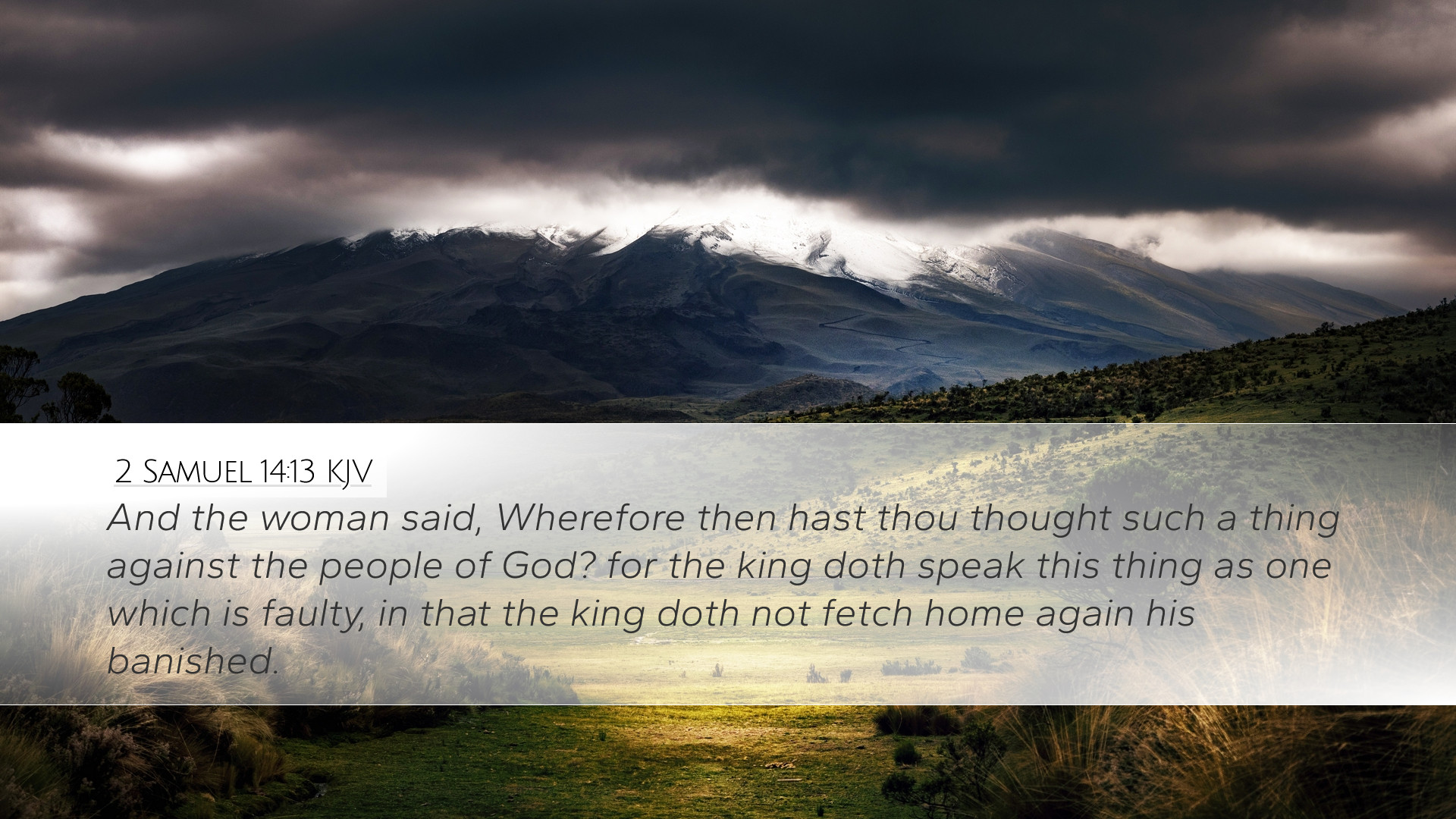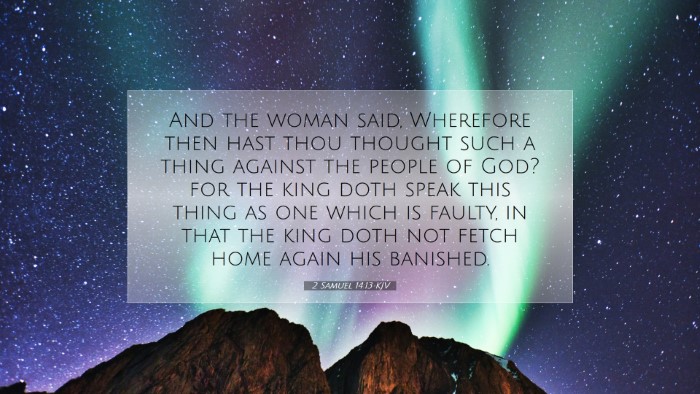Commentary on 2 Samuel 14:13
Verse Context: 2 Samuel 14:13 states, "And the woman said, 'Why then have you planned such a thing against the people of God? For in giving this decision the king convicts himself, inasmuch as the king does not bring back his banished one.'" This verse is part of a narrative where a wise woman from Tekoa is presenting a parable to King David in order to persuade him to reconcile with his banished son, Absalom.
Exegesis and Theological Insights
This passage highlights themes of justice, mercy, and the need for reconciliation. The wise woman, through her poignant words, emphasizes the inconsistency within the king's own judgment. By seeking to uphold a standard for others that he himself does not follow, David is shown to be in a precarious position. This situation ultimately raises questions about divine justice and the role of human judgment.
Key Themes
-
Inconsistency in Leadership:
Albert Barnes emphasizes how the woman's words reflect upon the king's duty. If David is willing to overlook crimes for others, he must apply the same grace to his own family. This inconsistency may communicate deeper truths about God's character and the nature of divine forgiveness as mirrored in human relationships.
-
The Role of Intercession:
Matthew Henry notes that the woman acts as an intercessor, highlighting the importance of mediation in conflicts. Her role symbolizes how one can advocate for reconciliation and the restoration of relationships, which is a critical aspect of pastoral care.
-
Justice and Mercy:
Adam Clarke discusses the balance between justice and mercy as presented in this passage. The king's inclination to justly punish is countered by the call to show mercy, thereby bringing a theological depth to the necessity of compassion alongside justice.
The Wise Woman's Persuasion
The narrative structure of 2 Samuel 14 highlights the cunning of the woman as she weaves a tale that reflects David's own situation. This eloquent approach not only underscores her intelligence but also serves as a vital instructional point regarding communication and persuasion in leadership contexts.
Lessons for Pastoral Leadership
-
Emotional Intelligence:
Effective leaders must navigate emotional landscapes, understanding the feelings and motives of both their own hearts and those of others, as demonstrated by the woman who empathizes with both parties involved.
-
Encouraging Reconciliation:
Pastors and church leaders are called to foster reconciliation within their congregations. The exchange between the wise woman and David serves as a reminder of the gravity of restoring relationships — both with God and one another.
-
Clarity in Judgment:
David’s failure to bring Absalom back raises questions about clarity in leadership. Leaders today must ensure their judgments are fair and reflective of their principles to maintain credibility and trust.
Divine Justice as a Model
This passage ultimately leads readers to consider the broader theological implications of divine justice. Just as the woman sought to guide David towards the path of reconciliation, scripture frequently presents God as the ultimate reconciler, offering forgiveness and a path to restoration.
Reflection for Theologians
-
Understanding God’s Character:
The interchange between the woman and David echoes the divine balance of justice and mercy. Theologians can reflect on how God’s dealings with humanity mirror such complexities and can invoke deeper considerations of grace.
-
Theological Implications of Exile:
Absalom's banishment symbolizes the broader theme of exile in scripture, prompting theological reflection on themes of sin, separation from God, and the longing for homecoming.
-
Parables in Teaching:
This passage serves as a striking example of the power of parabolic storytelling. Biblical scholars can appreciate how parables serve to illuminate moral truths and lead individuals to deeper self-reflection.
Conclusion
2 Samuel 14:13 serves as a profound reminder of the challenges and responsibilities of leadership, the importance of reconciliation, and the nuanced interplay of justice and mercy. Through the wise woman's appeal, readers are invited to reflect on their own lives and ministries, considering how they can embody the principles of grace, judgment, and the sincere desire for restoration in their relationships with others.


